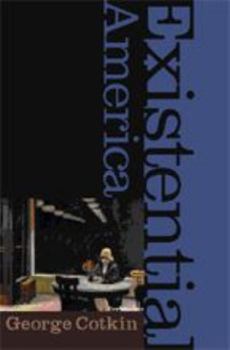Existential America
Select Format
Select Condition 
Book Overview
Europe's leading existential thinkers--Jean-Paul Sartre, Simone de Beauvoir, and Albert Camus--all felt that Americans were too self-confident and shallow to accept their philosophy of responsibility, choice, and the absurd. There is no pessimism in America regarding human nature and social organization, Sartre remarked in 1950, while Beauvoir wrote that Americans had no feeling for sin and for remorse and Camus derided American materialism and...
Format:Hardcover
Language:English
ISBN:0801870372
ISBN13:9780801870378
Release Date:January 2003
Publisher:Johns Hopkins University Press
Length:368 Pages
Weight:1.65 lbs.
Dimensions:1.2" x 6.6" x 9.7"
Customer Reviews
2 ratings
An engrossing and highly entertaining read
Published by Thriftbooks.com User , 16 years ago
George Cotkin has written a fascinating history of the existential themes and concerns that have run throughout the course of American intellectual history. Drawing from sources ranging not only from philosophy and religion but from literature, art, photography, theater and, surprisingly, even politics and popular social criticism, Cotkin reveals that, far from being merely a European concern, existentialism was already deeply embedded within the American psyche by the time Sartre visited the U.S. in the 1940s. Indeed, existential concerns informed the works of American pragmatist philosopher William James, as well as Supreme Court justice Oliver Wendell Holmes (who are also both featured in Louis Menand's excellent work The Metaphysical Club) in the nineteenth and early twentieth centuries. Cotkin himself locates the beginnings of our own existentialist tradition in the Calvinist tradition and the psychic ravages experienced by the nation as a result of its experiences with the Civil War, slavery, and the mass annihilation of Native Americans, and daily grind associated with life in the 1800s. Despite our reputation for liberal optimism, nineteenth century American culture was deeply steeped in moral contradiction and death and the resulting anguish is evidenced in the works by many early American writers such as Herman Melville, the so-called American Dostoyevsky. Hence, when Kierkegaard was finally translated into English in the 1940s, the American academic audience was receptive and the impact was immediate, particularly in religious and social criticism circles. Interestingly enough, Sartre and Beauvoir had only limited influence in the 1940s and `50s in large part due to their leftwing politics, which alienated the staunchly anti-communist New York intellectuals. In a systematic yet exciting fashion, Cotkin traces the chronology of European existentialist influence upon American thinkers, beginning with Kierkegaard on through Sartre, Camus, Beauvoir, and Heidegger on American thinkers, artists, and activists. The breadth of Cotkin's analysis is amazing. Novelists Richard Wright, Ralph Ellison, and writer Norman Mailer are featured at length, with briefer treatments of works by Herman Melville, Stephen Crane, Dorothy Sayers, and William March (The Bad Seed), and hardboiled detection fiction writers such as James M. Cain (whose work inspired Camus' The Stranger), and Dashiell Hammett. In addition, novelist and dramatist Thornton Wilder are given broader treatment, while the works of playwrights Eugene O'Neill, Samuel Beckett, and poets W.H. Auden, Emily Dickinson are briefly discussed or mentioned in passing, as is Leonard Bernstein's Symphony No. 2 for Piano and Orchestra. Especially delightful are Cotkin's discussions of painters Edward Hopper, Mark Rothko, photographer Robert Frank (whose works appeared in the famous Family of Man exhibition), and art critic Harold Rosenberg's analyses of the American Action Painters, includi
Great Book, Important Subject
Published by Thriftbooks.com User , 21 years ago
Cotkin has done a wonderful job of taking a very complex subject (one which seems to attract bad writers as well) and turning it into a good story. Best of all: He writes in jargon-free English. Perfect for a Senior seminar in American intellectual history. How was existentialism received in America? Read the book.





